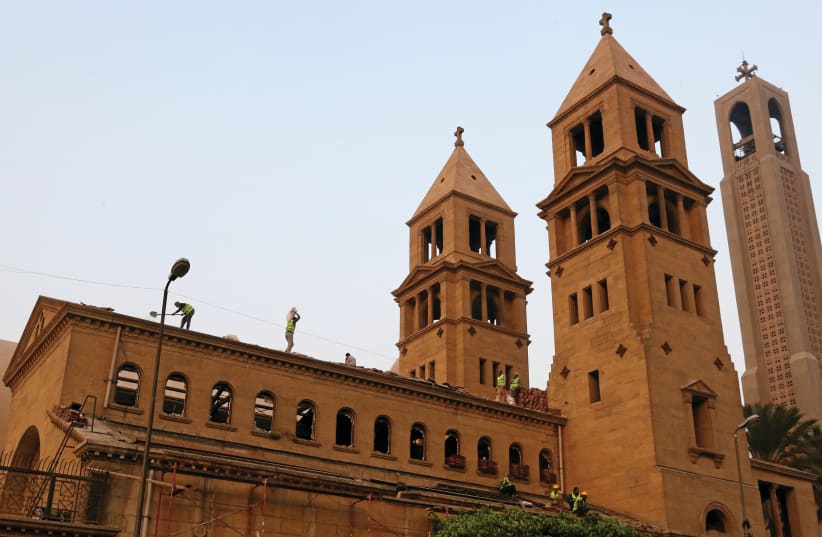Copts (Egyptian Christians) living in Egypt or in adoptive countries have common attributes – they are peace-loving, belong to strong large families with low divorce rates, have a lower mean age than the rest of civilized world, respect their elderly, value education and work, are always willing to help those in need, are courteous and use respectful non-obscene language. I lived the first 38 years of my life in Egypt and the past 47 years as an American; I increasingly observe a difference in attitudes and expression between those residing in the homeland and those adopted by the wealthy democratic countries.
Here are my subjective observations:
Christians living in Egypt (Copts) are even closer to their families than those in the diaspora; are more religious and follow instructions from the religious leaders. They have learned to play the Egyptian game and are content with any improvement in their treatment. They realize that generations of increasing persecution can’t be erased or reversed overnight (without realizing it, they are the epitome of Natchez’s dictum of not making the perfect the enemy of the good – by which they are content with their lots).They are not surprised at being considered second class by occasional factions of extremist Muslims as long as the trend is favorable. Almost without exception, they tell me that matters are improving, the chances of work and promotion are definitely better and systematic discrimination against them is diminished.
They recall how their lot became precarious during the recent rule by Muslim Brothers for a year in 2012-13. At that time, more than a hundred churches were burnt, some to the ground. Many Copts were killed, their women raped and their children enslaved. Many were orphaned or fled the country and thousands of Muslim fanatics were appointed to key positions. Copts felt that life in Egypt had become insecure for them, as the country as a whole rejected them. At that time, many Egyptian Copts sought refuge in Australia, Europe, Canada, America and other countries.
By contrast, they now feel that matters are becoming more favorable. Pockets of persecution still exist, but are significantly diminished. Christians are being appointed to some key positions and many of them have been recently promoted. Jobs are becoming more available to them. They tell me that their children plan to stay in Egypt to help in its rebuilding. They frequently remind me that our church has been called “the Church of Martyrs” for a reason and that God will never forsake Egyptian Christians.
By contrast, Copts in the diaspora emphasize that natural human rights are freedom and equality for all, and that Copts in Egypt are deprived of both. Persecution and discrimination persist. In addition, laws apply unfairly to Christians, including regarding the building of churches, harassment during prayers and in one-sided blasphemy laws. Furthermore, they worry that Christians are not secure in Egypt and that the Egyptian government and the Church, concerned more about the image of Egypt in the world than the plight of the Copts locally, systematically under-report bad news and maximize the good. They view the attitudes of their brothers and sisters in Egypt as unrealizable wishful thinking, since some actions from high officials do not match their sweet words. They see extremists at Al-Azhar (the center for Sunni Islam) and imams speaking and inciting violence against Copts while the Egyptian government avoids overt regulation of these evil spirits or abolishes religion as the litmus test in worldly decisions.
I don’t question the sincerity or veracity of either side. Locally, they feel that the Copts are in a better situation. They are visited frequently by President Sisi, who is doing his best in word and deed to make sure that Christians are treated better on all levels, although his abilities are limited. By contrast, his actions are viewed to be inadequate by developed countries.
In ancient times, freedom and equality were preached by Socrates, Plato, promulgated in numerous publications by Aristotle and chronicled by Cicero. More recently, they were defended by philosophers from the 18th century and beyond – especially by Emmanuel Kant, who emphasized that all humans have equal “intrinsic human values,” while John Stewart Mills and Alexis De Tocqueville warned against the “tyranny of the masses.” This progress in our thinking has been included in the constitutions of all developed nations. Notably, the latest Egyptian constitution is not clear about the role of religion in various affairs of the society.
What is the cause of this discrepancy? It is because we see the same things through different sets of eyes. Justice Benjamin Cardozo said in 1921, “We may try to see things as objectively as we please. Nonetheless, we can never see them with any eyes except our own.
The author is an MD, FRCP, FACC.
